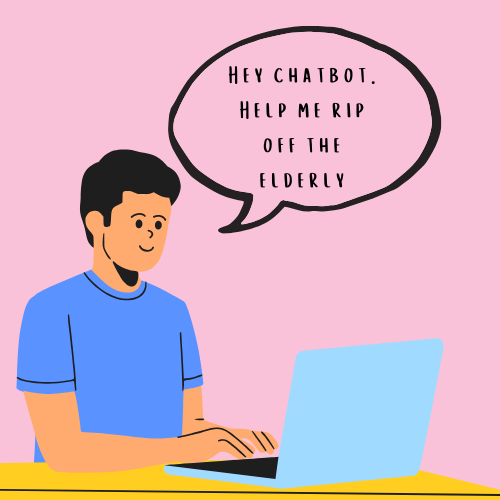5 Ways People Are Misusing Chatbots
Chatbots were always going to be misused, but could we have envisioned that these five misuses would become so prevalent?
Chatbots have changed the way we disagree with one another. Today, we don’t take the time to access our memory bank of facts. Instead, we immediately consult a chatbot to tell us who appeared in the most James Bond films, sold the most records or won the most Premier League titles. And, of course, it is fine, as one would expect AI to know the answers to these simple questions.
However, global chatbot users are taking their ready-made responses as absolute gospel, with the risk of severe mental health repercussions just one of the ways putting all one’s trust into a chatbot can present.
We humans need to remember that chatbots learn from human interactions on the Internet. And, given how fallible we are as humans, there can be numerous disadvantages of using chatbots, especially when it comes to the following ways in which we are using the 21st Century’s most incredible technological achievement:
1. Looking for romance in your chatbot
Recently, a 17,000-member Reddit group called “MyBoyfriendIsAI” took an upsetting turn. Its members, many of whom viewed themselves as being in an intimate relationship with their ChatGPT portal, were bereaved with the provider’s GPT-5 update. Why? Because they found that the new update was emotionally distant in comparison to its GPT-4o predecessor.
The new update left many users distressed as they felt their love for the chatbot had suddenly become unrequited. Replacing real human connection with a chatbot could be a real indicator that the AI era will have significant implications on human connection and increase the risks of isolation.
2. Believing your chatbot is always right
A recent Columbia Journalism Review study found that chatbots provide incorrect answers for 60% of search queries. This is an alarming majority when you consider the number of people who use chatbots as a source of absolute truth. We have to remember that chatbots are still in their infancy and will take years to provide more accurate and trustworthy answers.
With enhanced contextual understanding, multilingual capabilities, natural learning processes, predictive intelligence and self-learning, chatbots will soon be able to answer even our more complex queries. But, in the meantime, it’s important not to use them as a source of absolute truth, as this is another troublesome disadvantage of using chatbots.
3. Relying on them for mental health support
Because, just like romance, there will never be a substitute for real mental health support. Chatbots, unlike humans, are not sentient beings, meaning they cannot provide the level of empathy or understanding that comes with a human interaction.
And, given that chatbots are designed to provide bias reinforcement (telling us exactly what we want to hear), there is the risk of chatbots leading particular individuals down a dangerous path when it comes to their mental health. At the very least, it’s important to remember that chatbots guide the user towards seeking real mental health support, as opposed to resting on what they say as proper guidance.
4. Using a chatbot to bypass actual learning
A recent MIT study found that regular ChatGPT users demonstrate lower brain engagement. This is incredibly concerning given the prevalence of people, both young and old, using the technology to bypass their actual learning. We humans need to conduct deep dives into subjects to understand their nuances beyond the facts.
Unfortunately, chatbots are having a disastrous impact on our human desire to properly understand a subject. We are having enormous phases of world history summarised to us in a few dot points before taking the information and relaying it as if we were respected historians. We are using chatbots to prepare for interview situations. We are using them to do our homework.
A chatbot is no substitute for profound learning, but its ease and simplicity are making it a far more appealing option. Unfortunately, it appears that using them to bypass actual learning is one of the main disadvantages of using chatbots, but will we ever choose effort over ease?
5. Using a chatbot for illegal means
Well, this was just always going to happen, especially if your chatbot can provide you with "hypothetical scam scenarios for educational purposes”. Chatbots are being used for all kinds of nefarious deeds, from distributing malware to money laundering, phishing, social engineering and more.
Chatbot providers must be on top of how people are using their products for illegal means. After all, chatbots are only expected to become more sophisticated, so keeping ahead of any questionable usage should be able to prevent plenty of cybercrime.


